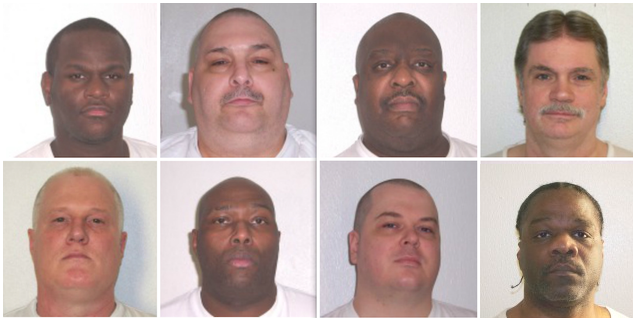Eight Arkansas inmates were scheduled to be put to death over 10 days in April in proclamations issued by Gov. Asa Hutchinson on Monday.

EXECUTIONS: In-depth look at 4 men put to death in April + 3 others whose executions were stayed
Click here for larger versions
According to copies of the proclamations given to the secretary of state's office, the state plans to conduct the executions in pairs on each of four days starting April 17 and ending April 27. Arkansas has not executed anyone in more than 11 years because of court challenges and difficulty in obtaining lethal injection drugs.
However, it remains unknown whether the Department of Correction will be able to carry out the executions, as the state lacks one of the three drugs in its current execution protocol.
Continued legal objections also could disrupt the schedule. Shortly after the proclamations were issued, a federal public defender for the inmates sent Hutchinson a letter arguing that a stay of the executions is still in place by the Arkansas Supreme Court.
Attorney General Leslie Rutledge's office contended no such stay exists, but nonetheless filed an emergency motion seeking clarity from the state's high court.
The executions are set to be carried out as followed, according to the governor's proclamations:
• Don Davis and Bruce Earl Ward are scheduled to die on April 17.
• Ledelle Lee and Stacey Johnson, April 20.
• Marcell Williams and Jack Jones Jr., April 24.
• Jason McGehee and Kenneth Williams, April 27.
In a phone call from Washington, D.C. -- where the governor was leaving the weekend's winter meetings of the National Governors Association -- Hutchinson said he had spoken with prison officials and been "assured" that the department was prepared to have the drugs necessary to carry out executions in the scheduled time frame.
However, a spokesman with the Department of Correction said Monday there had been no change since the state's supply of potassium chloride expired last month. He also said he was unaware of any efforts to find another batch.
The U.S. Supreme Court last week declined to hear the prisoners' challenge of the state's execution statutes as amended by Act 1096 of 2015. The U.S. court action led the Arkansas high court to end its stay on executions that was placed after its decision to uphold the law last June. Rutledge then sent letters Friday to the governor asking him to set new execution dates.
But John Williams, the inmates' federal public defender, wrote in his letter to Hutchinson that an earlier stay -- placed by the state Supreme Court upon its decision to hear a state appeal of a 2015 Circuit Court decision invalidating a portion of law -- remains in effect.
Williams and another attorney for the inmates, Jeff Rosenzweig of Little Rock, filed an amended version of their complaint from the earlier Circuit Court case on Friday, seeking an injunction to block the executions on the argument that the protocol set by Act 1096 amounts to cruel and unusual punishment.
At the heart of that argument lies midazolam, the first in the series of injections in the "three-drug cocktail," used for the purpose of blocking the pain caused by the subsequent drugs.
However, the amended complaint argues that the actual effect of the drug is "cloaking such torture by paralyzing the subject as he is burned alive from the inside."
Midazolam has been linked to botched executions in several other states, but the U.S. Supreme Court has said that inmates must come up with other known and available methods of execution to challenge the constitutionality of the drug.
Also a factor in the scheduling of the executions is the state's supply of midazolam, which is set to expire in April.
If the executions are allowed to proceed using midazolam, Rosenzweig said, state officials are "probably heading for the disgrace of a botched execution."
"I think that's asking a whole lot of a prison authorities," Rosenzweig said of the rapid pace of the scheduled executions. "The idea of killing that many people in that short a time period evokes an assembly line."
But in a statement from his office, Hutchinson said it is time to resume the process of executions.
"This action is necessary to fulfill the requirement of the law, but it is also important to bring closure to the victims' families who have lived with the court appeals and uncertainty for a very long time," the statement read.
Compared with other Southern states, Arkansas has gone the longest period of time since conducting an execution. Eric Nance, a convicted murder, was killed in November 2005, and since then the execution chamber at Cummins Unit in Grady has been dormant.
There are currently 34 housed on death row, all of them men.
A Section on 02/28/2017
